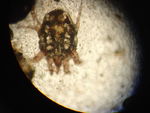Difference between revisions of "Psoroptes"
Jump to navigation
Jump to search
| (5 intermediate revisions by one other user not shown) | |||
| Line 1: | Line 1: | ||
| − | {{ | + | {{OpenPagesTop}} |
| − | |||
{{Taxobox | {{Taxobox | ||
|name = Psoroptes | |name = Psoroptes | ||
| Line 17: | Line 16: | ||
''Psoroptes'' is an oval shaped, astigmatic, non-burrowing mite, causing [[Psoroptic Mange|psoroptic skin infestation]] in cattle, sheep, horses and rabbits. The most common species of ''Psoroptes'' seen within the UK are ''[[Psoroptes ovis]]'', and ''[[Psoroptes cuniculi]]''. | ''Psoroptes'' is an oval shaped, astigmatic, non-burrowing mite, causing [[Psoroptic Mange|psoroptic skin infestation]] in cattle, sheep, horses and rabbits. The most common species of ''Psoroptes'' seen within the UK are ''[[Psoroptes ovis]]'', and ''[[Psoroptes cuniculi]]''. | ||
| − | [[Image:Psoroptes cuniculi.jpg|150px|thumb|right|'''Psoroptes cuniculi (Copyright Joel Mills, Wikimedia Commons) | + | [[Image:Psoroptes cuniculi.jpg|150px|thumb|right|'''''Psoroptes cuniculi''''' (Copyright Joel Mills, Wikimedia Commons) ]] |
==Identification== | ==Identification== | ||
| Line 28: | Line 27: | ||
The Adult female is capable of laying up to 100 eggs during her life time, which is usually just one month. The duration of the life cycle is around 10 days, and consists of two nymphal stages. | The Adult female is capable of laying up to 100 eggs during her life time, which is usually just one month. The duration of the life cycle is around 10 days, and consists of two nymphal stages. | ||
| − | = | + | {{Learning |
| + | |flashcards= [[Mites_Flashcards|Mites Flashcards]] | ||
| + | |literature search = [http://www.cabdirect.org/search.html?rowId=1&options1=AND&q1=Psoroptes&occuring1=title&rowId=2&options2=AND&q2=&occuring2=freetext&rowId=3&options3=AND&q3=&occuring3=freetext&x=37&y=8&publishedstart=yyyy&publishedend=yyyy&calendarInput=yyyy-mm-dd&la=any&it=any&show=all ''Psoroptes'' publications] | ||
| + | |Vetstream = [https://www.vetstream.com/canis/search?s=mite Mites] | ||
| + | }} | ||
| + | |||
| + | |||
| + | {{review}} | ||
| − | + | {{OpenPages}} | |
[[Category:Non-Burrowing Mites]] | [[Category:Non-Burrowing Mites]] | ||
| − | + | ||
[[Category:Expert_Review]] | [[Category:Expert_Review]] | ||
Latest revision as of 17:17, 4 June 2016
| Psoroptes | |
|---|---|
| Kingdom | Animalia |
| Phylum | Arthropoda |
| Class | Arachnida |
| Sub-class | Acari |
| Order | Sarcoptiformes |
| Family | Psoroptidae |
| Genus | Psoroptes |
Psoroptes is an oval shaped, astigmatic, non-burrowing mite, causing psoroptic skin infestation in cattle, sheep, horses and rabbits. The most common species of Psoroptes seen within the UK are Psoroptes ovis, and Psoroptes cuniculi.
Identification
Psoroptes is an oval shaped, with legs longer than those seen in burrowing mites. The males have a pair of copulatory suckers. It is of the family Psoroptidae.
Life cycle
Psoroptes are confined to the skin surface, and feed on serous exudate by a siphoning process.
The Adult female is capable of laying up to 100 eggs during her life time, which is usually just one month. The duration of the life cycle is around 10 days, and consists of two nymphal stages.
| Psoroptes Learning Resources | |
|---|---|
To reach the Vetstream content, please select |
Canis, Felis, Lapis or Equis |
 Test your knowledge using flashcard type questions |
Mites Flashcards |
 Search for recent publications via CAB Abstract (CABI log in required) |
Psoroptes publications |
| This article has been peer reviewed but is awaiting expert review. If you would like to help with this, please see more information about expert reviewing. |
Error in widget FBRecommend: unable to write file /var/www/wikivet.net/extensions/Widgets/compiled_templates/wrt6989186e4f9301_66860393 Error in widget google+: unable to write file /var/www/wikivet.net/extensions/Widgets/compiled_templates/wrt6989186e5c4e97_96929544 Error in widget TwitterTweet: unable to write file /var/www/wikivet.net/extensions/Widgets/compiled_templates/wrt6989186e621e62_15684516
|
| WikiVet® Introduction - Help WikiVet - Report a Problem |
